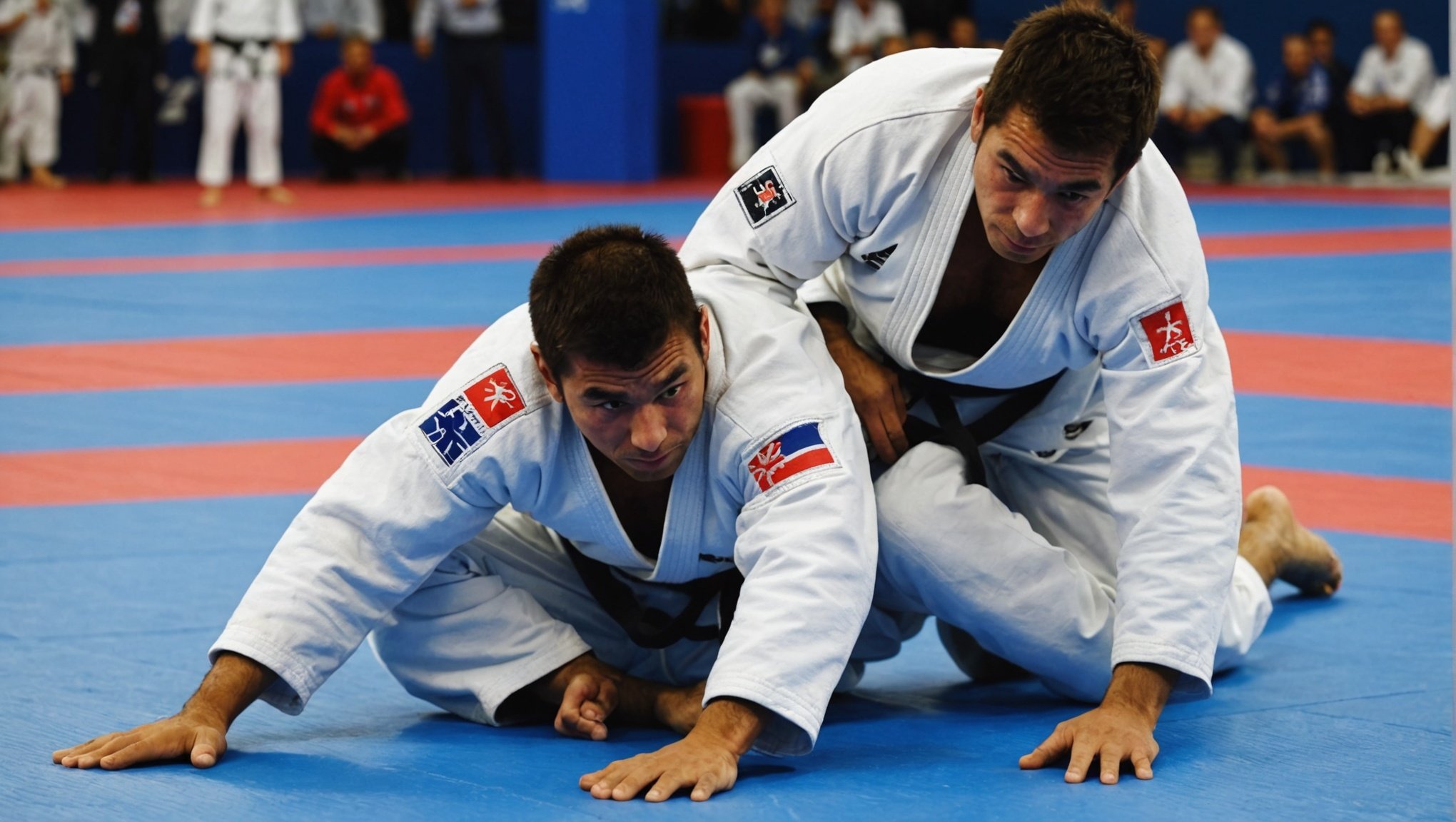Unlocking Success: Effective Tactical Strategies for UK Judo Competitors in Match Preparation
Understanding the Foundations of Judo
Judo, a martial art that emphasizes grappling and ground fighting, is a highly demanding sport that requires a combination of physical strength, technical skill, and mental toughness. For UK judo competitors, preparing for a match involves a multifaceted approach that includes rigorous training, strategic planning, and mental preparation.
Physical Training and Conditioning
Physical training is the cornerstone of judo preparation. Athletes must focus on building strength, endurance, and flexibility. Here are some key aspects of physical training:
Have you seen this : Unlocking Recovery: The Vital Role of Heart Rate Variability for UK Combat Sports Athletes
- Strength Training: Incorporating weightlifting and resistance band exercises to enhance overall strength, particularly in the upper body, core, and legs.
- Example: Squats, deadlifts, and bench presses are essential for building the power needed for throws and takedowns.
- Cardiovascular Endurance: Engaging in high-intensity interval training (HIIT) and aerobic exercises to improve cardiovascular fitness.
- Example: Running, cycling, or swimming for at least 30 minutes, three times a week.
- Flexibility and Mobility: Incorporating yoga or dynamic stretching to improve flexibility and range of motion.
- Example: Regularly practicing judo-specific stretches like the “sumo squat” and “leg swings.”
Tactical Strategies in Judo
Tactical strategies are crucial for success in judo competitions. Here are some key strategies that UK judo competitors should consider:
Pre-Match Analysis
Before stepping onto the mat, it’s essential to analyze your opponent. Here are some steps to follow:
Also read : Unlocking Competitive Potential: The Role of Mindfulness for UK Combat Sports Athletes
- Opponent Research: Watch videos of your opponent’s previous fights to identify their strengths, weaknesses, and favorite techniques.
- Example: Analyze their throwing techniques, ground game, and any patterns in their fighting style.
- Identify Vulnerabilities: Look for any vulnerabilities or areas where your opponent might be less skilled.
- Example: If your opponent is weak in defending against certain throws, plan to exploit this during the match.
Match Strategy
During the match, having a clear strategy can make a significant difference. Here are some tactical considerations:
- Starting Strong: Begin the match aggressively to set the tone and gain an early advantage.
- Example: Use a strong grip fight to control the center of the mat and dictate the pace of the match.
- Adapting to the Situation: Be prepared to adjust your strategy based on how the match is unfolding.
- Example: If your initial plan isn’t working, switch to a different set of techniques or focus on defending and waiting for an opportunity to counterattack.
Mental Preparation and Toughness
Mental preparation is as important as physical training in judo. Here are some strategies to enhance mental toughness:
Visualization Techniques
Visualization is a powerful tool for mental preparation. Here’s how to use it effectively:
- Visualize Success: Imagine yourself winning the match and performing well.
- Example: Close your eyes and vividly picture yourself executing perfect throws and submissions.
- Manage Stress: Use visualization to manage stress and anxiety before and during the match.
- Example: Visualize yourself staying calm and focused under pressure.
Positive Self-Talk
Positive self-talk can significantly impact performance. Here’s how to incorporate it into your preparation:
- Affirmations: Use positive affirmations to boost confidence and focus.
- Example: Repeat phrases like “I am strong,” “I am prepared,” and “I will win” before the match.
- Focus on the Process: Instead of worrying about the outcome, focus on the process of executing your techniques perfectly.
- Example: Concentrate on the feeling of executing a perfect throw rather than worrying about winning.
Nutrition and Recovery
Proper nutrition and recovery are critical for optimal performance in judo.
Nutrition
A balanced diet is essential for maintaining energy levels and supporting muscle growth and repair. Here are some nutritional tips:
- Hydration: Stay hydrated by drinking plenty of water throughout the day.
- Example: Aim to drink at least 2 liters of water per day.
- Balanced Diet: Ensure your diet includes a balance of proteins, carbohydrates, and healthy fats.
- Example: Include foods like lean meats, whole grains, and vegetables in your meals.
Recovery
Adequate recovery is crucial to avoid injury and maintain performance levels. Here are some recovery strategies:
- Rest and Sleep: Ensure you get enough rest and sleep to allow your body to recover.
- Example: Aim for 7-9 hours of sleep each night.
- Stretching and Foam Rolling: Use stretching and foam rolling to reduce muscle soreness and improve flexibility.
- Example: Spend at least 10 minutes after each training session stretching and foam rolling.
Community and Support
Having a supportive community and coaches can significantly enhance your preparation and performance.
Training with a Team
Training with a team can provide valuable sparring opportunities and moral support. Here are some benefits:
- Sparring Partners: Training with different sparring partners exposes you to various fighting styles and techniques.
- Example: Join a judo club or dojo where you can train with other athletes regularly.
- Coaching and Feedback: Coaches can provide valuable feedback and guidance on your technique and strategy.
- Example: Work with a coach who can analyze your fights and provide constructive feedback.
Practical Insights and Actionable Advice
Here are some practical insights and actionable advice for UK judo competitors:
Detailed Training Plan
Creating a detailed training plan can help you stay focused and ensure you cover all aspects of your preparation.
| Week | Day | Morning Session | Afternoon Session |
|
|-----|
|-------------------|
| 1 | Mon | Strength Training | Judo Techniques |
| 1 | Tue | Cardiovascular | Sparring |
| 1 | Wed | Rest | Rest |
| 1 | Thu | Flexibility | Judo Drills |
| 1 | Fri | Strength Training| Sparring |
| 1 | Sat | Cardiovascular | Judo Techniques |
| 1 | Sun | Rest | Rest |
Mental Toughness Exercises
Here are some mental toughness exercises you can incorporate into your daily routine:
- Mindfulness Meditation: Spend 10 minutes each day practicing mindfulness meditation to improve focus and calmness.
- Example: Use an app like Headspace or Calm to guide your meditation sessions.
- Journaling: Write down your thoughts and feelings after each training session to reflect on your progress and identify areas for improvement.
- Example: Keep a journal where you note down what you did well and what you need to work on.
Quotes from Experts
Here are some quotes from experts in the field of martial arts and sports performance:
- Sam Vince, Woking Dojo Instructor:
“The key to success in judo is not just about physical strength, but also about mental toughness and strategic planning. Athletes need to be adaptable and able to adjust their strategy mid-match.” - Teddy Atlas, Renowned Boxing Trainer:
“Visualization is a powerful tool in any combat sport. It helps athletes prepare mentally and build confidence before stepping into the ring or onto the mat.”
Preparing for a judo match is a comprehensive process that involves physical training, tactical strategies, mental preparation, and proper nutrition and recovery. By focusing on these aspects and incorporating practical insights and actionable advice, UK judo competitors can unlock their full potential and achieve success in their matches.
Final Tips
- Stay Flexible: Be prepared to adjust your strategy based on how the match is unfolding.
- Focus on the Process: Concentrate on executing your techniques perfectly rather than worrying about the outcome.
- Seek Feedback: Work with coaches and training partners to get valuable feedback on your performance.
By following these tips and strategies, you can enhance your performance, build mental toughness, and achieve success in the world of judo. Remember, success in judo is not just about winning matches; it’s about continuous improvement and dedication to the sport.










